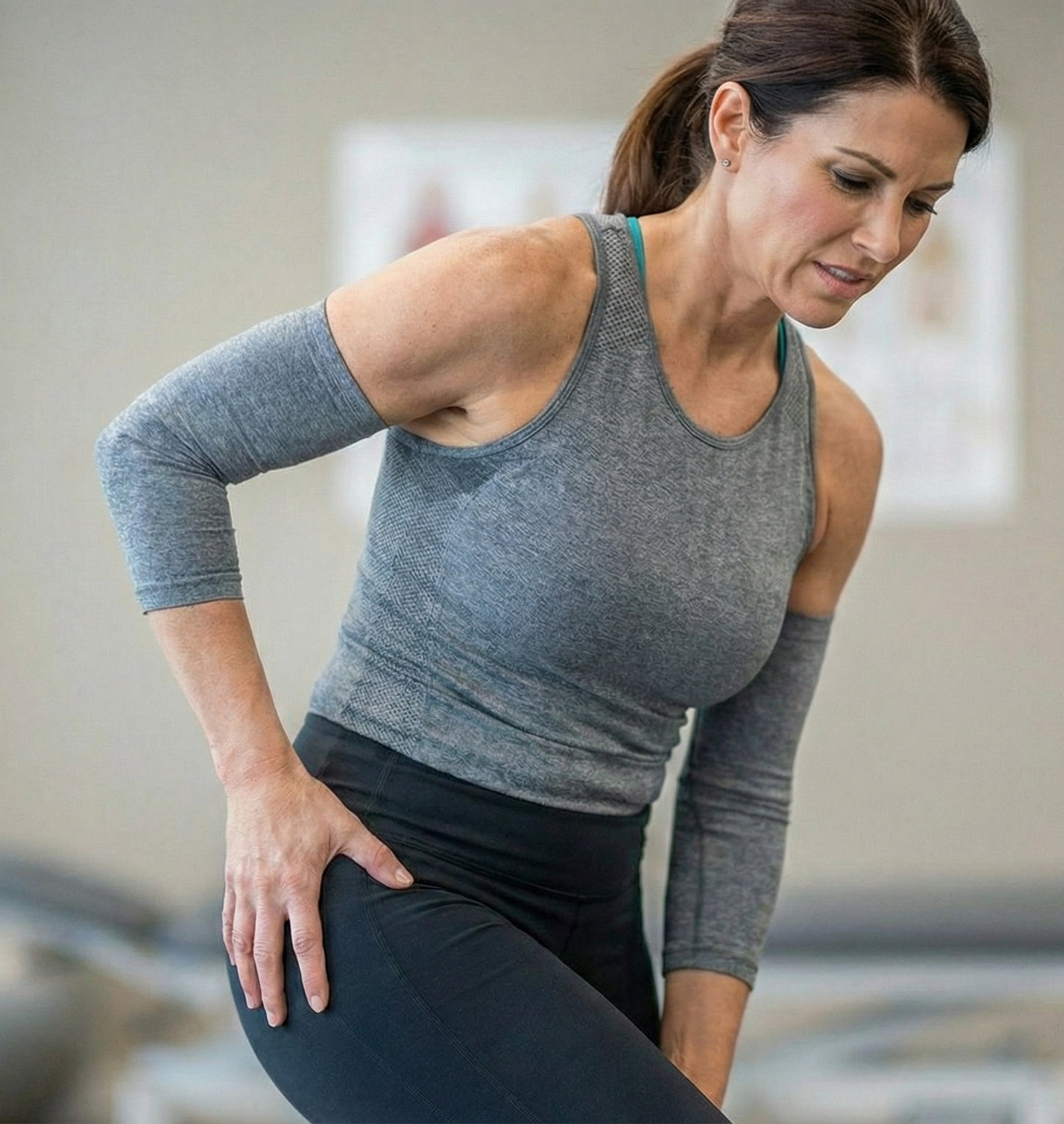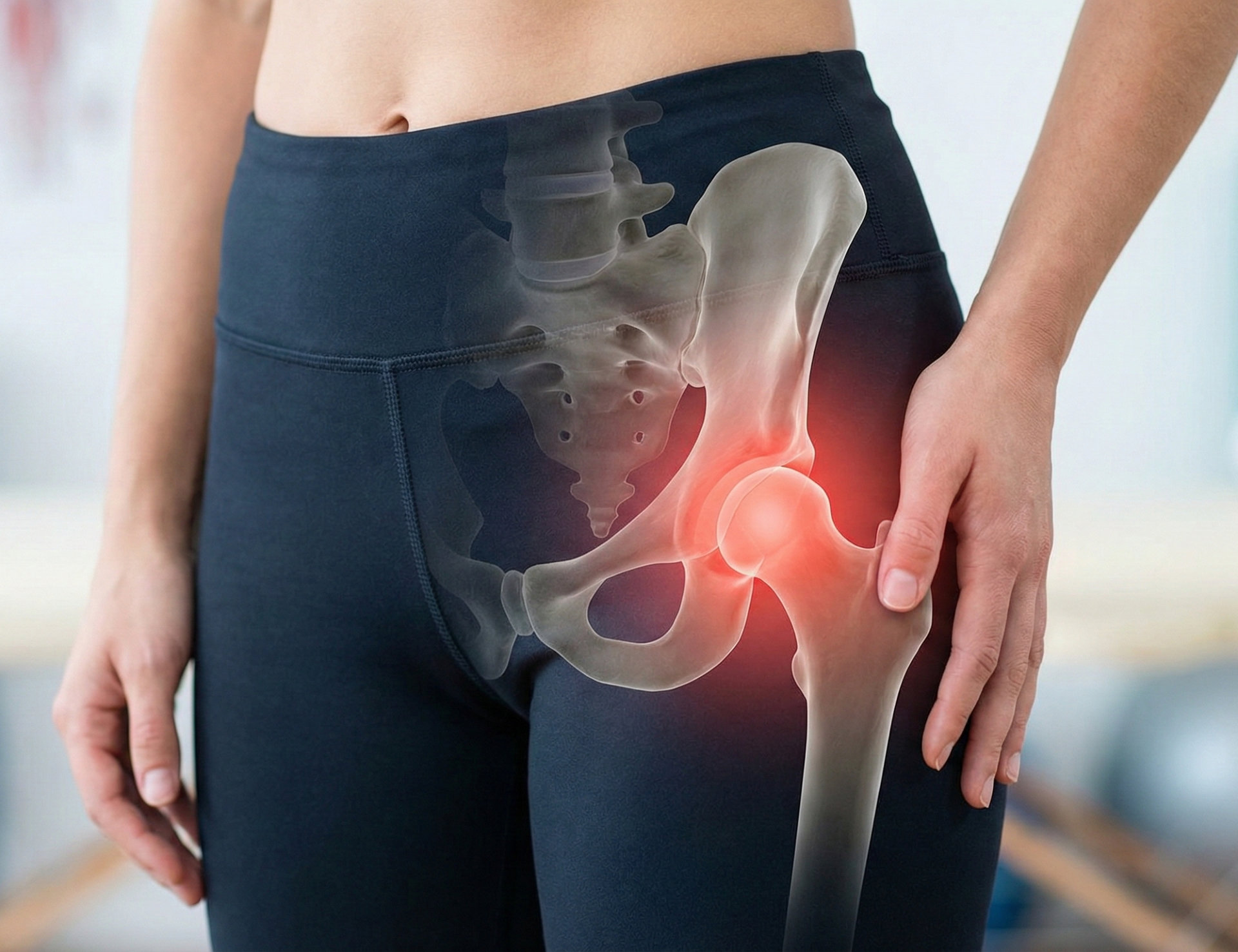Hip Pain Relief
Reclaim your strength and move confidently again, free from hip pain.
Start Your RecoveryRediscover a Life Untroubled by Hip Pain
Hip pain can be sharp and sudden, or a dull, persistent ache that keeps you from enjoying the activities that make life in Bend so special. Whether it’s keeping you off the hiking trails at Smith Rock, making a round of golf uncomfortable, or simply turning a walk along the Deschutes River into a chore, hip pain can put your life on hold.
At PhysioFIT, we believe you don’t have to live with those limitations. Our expert physical therapists in Bend tailor specialized hip pain solutions for you, the individual. We apply a scientific, fitness-oriented approach to physical therapy, focusing on personalized care paths towards relief. Our mission goes beyond just easing your hip pain; we aim to improve your overall well-being, mitigate the risk of persistent or long-lasting discomfort, and facilitate a quick recovery to your regular activities.

Understanding Your Hip Pain
Pinpointing the source of your hip pain starts with knowing how this powerful joint is designed to work.
Ball-and-Socket Joint
The hip, a sturdy ball-and-socket joint, enables a wide range of movement. The ball, at the top of your thigh bone, fits neatly into a hollow socket in your pelvis, contributing to the joint’s impressive mobility.
Muscles and Tendons
A network of muscles and tendons encase the hip joint, forming a protective capsule. This support system bolsters joint movement and contributes to leg and upper body motion.
Synovium and Cartilage
The synovium within the capsule lubricates the joint with synovial fluid and sustains the cartilage health. This cartilage buffers the hip joint bones, minimizing friction and impact during motion. This well-structured support mitigates hip dislocation, even during high-impact injury scenarios.
Common Symptoms of Hip Pain
- Presence of inflammation or a reddish hue in your hip.
- Discomfort in your groin, buttocks, or thigh area.
- Sensing rigidity when mobilizing your hip.
- Challenges in maneuvering your hip.
- Experiencing intense pain radiating down one side of your body (from the buttock extending down the leg).
- Experiencing a clicking, snatching, popping, or scraping feeling in your hip.

What Really Causes Hip Pain?
The cause of hip pain can vary considerably, stemming from various injuries or health conditions. The nature and severity of the pain often offers clues to its underlying cause.
Arthritis – A Persistent Pain Culprit
Long-term joint deteriorationLong-term hip pain is predominantly caused by arthritis, a condition characterized by painful, stiff, and tender joints that can impede normal mobility. Several forms of arthritis can affect the hip.
Osteoarthritis (OA)
The wearing down of protective joint cartilage due to age or use often results in osteoarthritis.
Traumatic Arthritis
A joint injury, like a fracture, may trigger this condition, which mirrors osteoarthritis.
Infectious Arthritis
This occurs when an infection in the joint leads to cartilage destruction.
Rheumatoid Arthritis (RA)
This autoimmune condition, where the body’s immune system attacks the joints, may cause extensive damage to joint cartilage and bones over time.
Tendonitis – Inflamed Tendons
Acute inflammation from overuseThe most frequently encountered source of acute hip pain is inflamed tendons, known as tendonitis. This inflammation generally results from excessive physical activity and while it can be quite painful, it typically subsides within a few days.
Trochanteric Bursitis – Inflammation Near the Hip Joint
Fluid sac inflammationHip pain may also be attributed to trochanteric bursitis, a condition that arises when the bursa, a fluid-filled sac near the hip joint, becomes inflamed. This inflammation can be triggered by hip injury, joint overuse, or postural issues. Moreover, other conditions such as RA can also lead to hip pain, with women being more prone to this condition.
Hip Fractures – Sudden, Severe Hip Pain
Requires immediate attentionHip fractures, often seen in older adults or individuals suffering from osteoporosis (a condition that weakens bones), present as sudden, intense hip pain. They necessitate immediate medical attention due to potential complications, such as leg blood clots.
A hip fracture usually demands surgical intervention followed by physical therapy to aid recovery and restore normal mobility.
Proactive Steps to Prevent Hip Injury
Your hip, a critical joint supporting your body weight during movements, requires utmost care for a pain-free life. By adopting certain habits, you can reduce wear and tear, minimize osteoarthritis risk – a leading cause of hip replacement – and uphold a high-quality life. Here are concise yet insightful tips to keep your hips injury-free
Resistance Training
Add functional resistance exercises like squats, lunges, and step-ups to your routine twice or thrice a week to enhance hip and leg muscle strength, promoting hip stability and reducing osteoarthritis risk.
Comfortable Footwear
Wear shoes with proper cushioning and arch support to absorb shocks and reduce joint strain. Seek advice from footwear experts if in doubt.
Healthy Weight Maintenance
It’s vital to maintain a weight within a healthy range. The hip bears forces up to 3-6 times body weight, meaning reduced weight equals less pain. Balance regular exercise with a nutritious diet to keep joints healthy.
Good Posture, Day and Night
During the day, sit tall with your feet flat and stand with your weight distributed evenly. At night, continue that support with pillows: place one between your knees if you’re a side sleeper, or under your knees if you sleep on your back to maintain healthy alignment.
Proper Warm-Up and Stretching
Prioritize warming up before exercise and stretching afterwards to boost blood flow and flexibility, reducing hip injury risk.
Modify Exercises
Adapt your workout regime as you age. Vary activities to avoid repetitive injuries and consider isometric exercises if regular movements cause pain. Listen to your body and adjust accordingly.
PhysioFIT Discovery Call!
Ready to find relief from hip pain? Call our clinic now.
Talk to a PT Specialist Today!Please Note
The information provided on our website is intended for general education and is not a substitute for professional medical advice. Each individual’s situation and body is different. Therefore, what may work for one person may not work for another. We care about your well-being and advise you to reach out to us to discuss your specific needs before implementing any advice from our website.